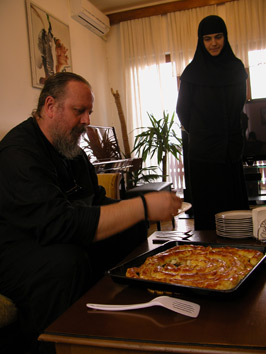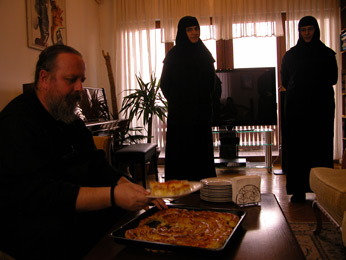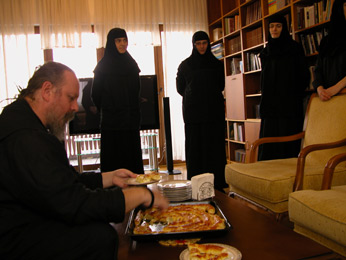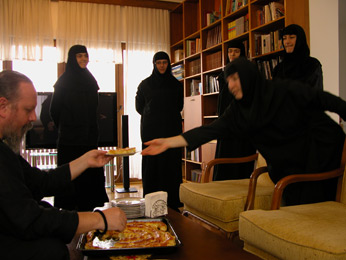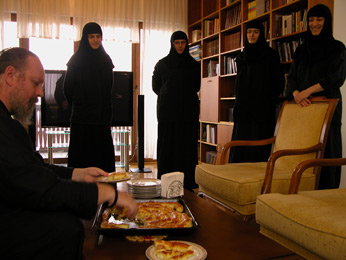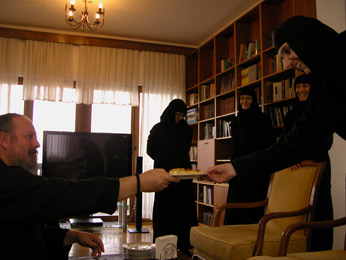Synaxis for the feast of St. Basil the Great in the Monastery the Protection of the Most Holy Theotokos in Vodocha ( 25.01.2010 )
Burn, If You Desire to Be Luminous
(Demystification of the mind-and-heart prayer or demystification of desperation)
Children, I have thought in what way to show you how in fact the prayer of the mind in the heart is very close to each one of us; I have thought how are we to demystify the very notion “mind-and-heart prayer” and free it from the undertone of something unreachable; and how, by that, to make the very practice of prayer our real day-to-day life. I believe that the counsels of Saint Nicephorus the Hesychast will help us much to this purpose:
“If, though, brother, even after much effort you do not succeed to enter the area of the heart, as I have told you, do this way, as I will tell you further on, and with God’s help you will find what you are seeking. You know that the inner voice of every man is in his chest. For, within the chest, when our lips are silent, we talk to ourselves and perform the prayer, we chant psalms or say something else. Thus, with the inner voice, chasing away from it any thought (because you can, if you want to), say the short prayer: Lord Jesus Christ, Son of God, have mercy on me!—and exert yourself instead of any other thought only it (the prayer) to mourn within you at all times. If you continue doing this work unyieldingly and with all your attention, in time through this the entrance will open to you to the heart, of which I have written to you, without any doubt, as we ourselves have come to know from experience.”
The inner voice, by which a man talks inside himself and practices the prayer silently, of which Saint Nicephorus of Italy says it is in the chest, more precisely said springs from the heart as our spiritual center. Along with being the place where the essence of the mind is, the heart is, thus, also the spring of the inner voice. If with the inner voice, instead of other thoughts, we say the prayer, we will make our heart also the spring of the personal prayer. Thus, we must strive to say with the inner voice the short prayer “Lord Jesus Christ, have mercy on me,” and the attention (or energy) of our mind to be collected through the very words of the prayer in Him, yet at the same time also in the spring of the prayer, in the heart. In that manner we will get much close to what the Holy Fathers have indicated to us as the ideal, and that is the concentration of the mind’s energy in its essence in the heart, or the so called undeluded circular prayerful movement of the mind. In its ascetical dimension, this struggle is made possible for us by faith, while in its graceful dimension, this struggle is made possible for us by the Holy Mystery of Baptism in the name of the Father, and of the Son, and of the Holy Spirit.
So that you understand the above quoted from Saint Nicephorus and so that its application in practice is easier for you (since there is a strange link in power between understanding and acting), you must make difference between the graceful opening of the heart for the mind-and-heart prayer and the ascetical penetration and staying of our mind in it. The heart’s opening to the mind-and-heart prayer is a gift of God that we humbly expect, whereas the penetration and the possibility for our mind to stay in the very heart is a gift of God that we already have.
Why is it important, in conformity with Orthodox anthropology, to make this difference and why are we explaining exactly that point in Saint Nicephorus’ works? Because all this shows us that even without our heart being opened to the mind-and-heart prayer and without us knowing the place of the heart in that manner, we can still keep our mind in the area of the heart before the gates of the Holy of holies and humbly expect the Lord’s promise: “to him who knocks it will be opened, and he who seeks finds. For what man is there among you who, if his son asks for bread, will give him a stone? Or if he asks for a fish, will he give him a serpent?” (cf. Matthew 7:8-10). Then, how much more will the Lord give to them who seek Him Personally? Also, because this making difference shows us our personal responsibility for the possibly failed struggle and wasted monastic time. And for this there is no justification.
The concentrated saying of the prayer inside the heart causes certain effects, first of all a certain kind of warmth. And, about how important this ascetical (when we exert ourselves) struggle is as well as about the effects that stem from it we will hear some more by the great Saint Theophanes the Recluse:
“Prayerful habit is not formed at once, rather it demands longlasting labor and exposure to great efforts. And it is in this labor to form the prayerful habit that the Jesus prayer helps the best as well as the warmth that accompanies it. Pay attention: both the prayer and the warmth are merely the means, not what is expected.
“Let us see now what does the warmth that accompanies this prayer mean. So that the mind can stick to one place during the repetition of the short prayer, it needs to be directed with attention inside the heart, because if it stays in the head, where there is constant noise of thoughts, the mind will not manage to focus on one thing. When the attention goes down in the heart, it will draw into one point all the powers of the soul and the body. That concentration of man’s entire life at one place immediately finds a response in a special feeling. That feeling is the beginning of the future warmth.
“This feeling, weak at the beginning, little by little intensifies itself, deepens, and from cold, as it is in the beginning, it turns into a warm feeling and keeps attention to it. This comes to happen in the way that at the beginning the attention is kept in the heart with the will-force and it produces the warmth in the heart with its own power. That warmth afterwards keeps the attention with no particular effort. Then they stimulate each other and they must remain inseparable, because the scattering of attention leads to decrease of the warmth, and the decrease of warmth—to weaker attention. Henceforth stems the law of spiritual life: ‘keep your heart in feeling towards God, and you will always abide in remembrance of God.’
We saw from the above-written that the attention and the warmth mutually attract and complement each other at the concentration of the mind in the heart, and they assist us significantly in abiding in remembrance of God. The following that has been elaborated and elucidated by Saint Theophanes is the question about the essence of that warmth—is it natural or is it spiritual warmth, as well as the question about our attitude towards that warmth. Because, as he himself says, we must pay attention to it that both the utterance of prayer and the warmth in the heart are merely the means, not the expected end. As I have said on other occasions, we, prayerfully giving ourselves, seek only Him, not some of His gifts. If our main attention and desire are redirected from the expected end, which is Christ God, towards the means, then we go astray of the right road, in a deadly area of delusion, of sin, and of the demon that watches over us. The consequence can also be the sharp pain in the heart at every attempt to enter within it with the mind, which can consequently distance us from the prayer for a longer period, all until we humble ourselves. Now, let us see what Saint Theophanes says:
“The question is now: is it spiritual warmth? No, it is not spiritual! It is common warmth, which comes from the blood. However, in view of it that it keeps the mind’s attention within the heart and thus contributes to the development of spiritual movements in it, about which (movements) we spoke earlier, it is called spiritual, yet only if it is not accompanied by pleasure-indulgence (this irregularity takes place when the warmth is in the area below the heart), and only if it keeps the soul and the body in a sober state.
“Another irregularity lies in it that a man, having become fond of that warmth, keeps solely on it, with no care for spiritual feelings, not even for the remembrance of God, but only with the care to maintain that warmth. This needs to be observed and corrected, since in that case what remains is only the warmth of the blood, the life warmth, and we must not consider it to be spiritual, graceful. (Hence) we can call this warmth spiritual only in the case when it is accompanied by spiritual prayerful movements. He who calls it spiritual without their existence, is wrong. And he who calls it graceful, he is under yet bigger deception.“
Unlike the natural warmth, the graceful or divine warmth appears and happens at what we have called graceful opening of the heart for the mind-and-heart prayer, which, for its part, is the end of the ascetical penetration and staying of the mind inside the heart before the gates of the Holy of holies. The manifestation of God’s grace is the moment that makes the heart open, so that the mind enters within prayerfully, recognizing without delusion the place of the prayer (heart). Afterwards follows ascetical sojourn and staying of the mind in the Holy of holies in the heart all until the fire and the warmth that will come to happen at that do not transform (spiritualize) into uncreated light the whole of the one who burns that way. Here is what Saint Theophanes says:
“Graceful warmth is special and, accordingly, it is spiritual. It is not related to the flesh and does not cause noticeable changes in the body, but it is witnessed to by a certain subtle, sweet feeling. Everyone can determine and observe the difference between these two types of warmth, simply, using the nature of these feelings as a guide. Everyone must do this for himself: in this part there is no space for anyone else and it is for no one else to do it.
“When your heart warms up by divine warmth, your inner transformation will begin. That fire will burn and melt everything inside you. In other words, it will start spiritualizing everything, all until it makes you completely spiritual. All until this fire appears, there will be no spiritualization, strive as we may towards the spiritual. Thus, the whole thing now lies in it how to acquire this fire. And I beseech you, direct all your efforts towards it.”
Children, we must also know the following so that we do not get confused: when we start with this kind of prayer, we will encounter darkness and indifference—that is, a closed door in the heart. This must not discourage us, on the contrary, we must persistently continue further on at least until we start feeling the natural warmth. Along with the tears of repentance (spiritual prayerful movements), this warmth will certainly be the hope that we will accomplish the end. Such a kind of prayer can already be called ascetical mind-and-heart prayer prior to the genuine or ascetical-graceful mind-and-heart prayer. The mind, once proud, distracted and darkened, since it is kept undistracted through the prayer words in the heart—in Christ God, becomes humble, collected, and little by little it illumines owing to the purification of its energy. In other words, this kind of prayer is accessible to everyone, and everyone who wants to and puts some effort can have it.
We must also pay attention to the basic preconditions: the monastery typikon (set of rules), which provides us conditions for extreme renunciation of the world or monastic exile, which at the same time means adjusting our way of life in line with the level of spiritual development at which we are. We must particularly watch out not to judge and condemn people, just as the ones we know so also, even more, the ones we have never met in our life. The Pharisee has done the first, as for the second—I do not know what to call it. If we happen to condemn someone, not only will we have to repent before God immediately, but we will have to prove that in deed, doing some good to the one we have condemned, contrary to our condemnation. And until then, instead of the practice of ascetical mind-and-heart prayer, Abba Anthony would recommend us warm porridge, as for ones ailing.
Metropolitan Nahum of Strumica
